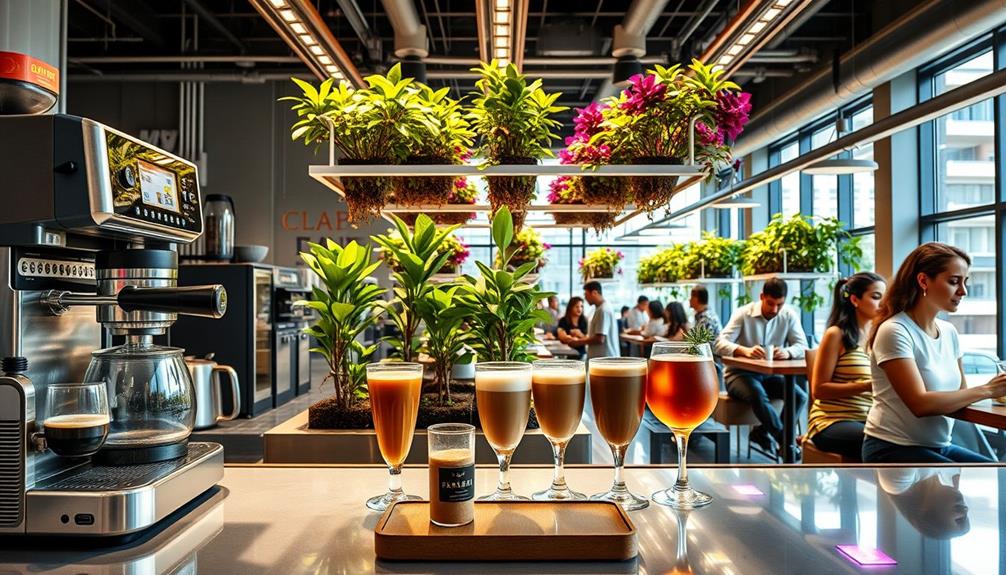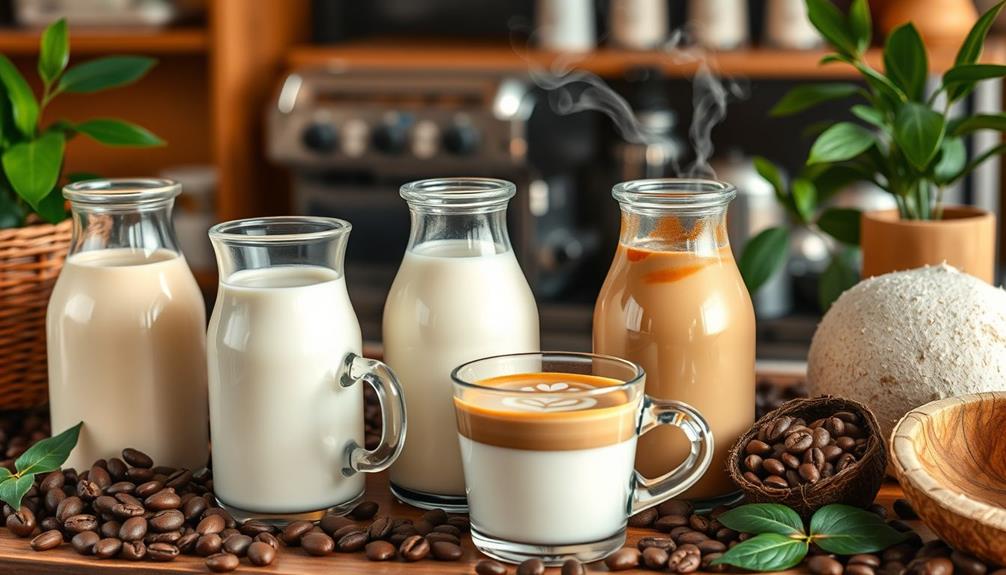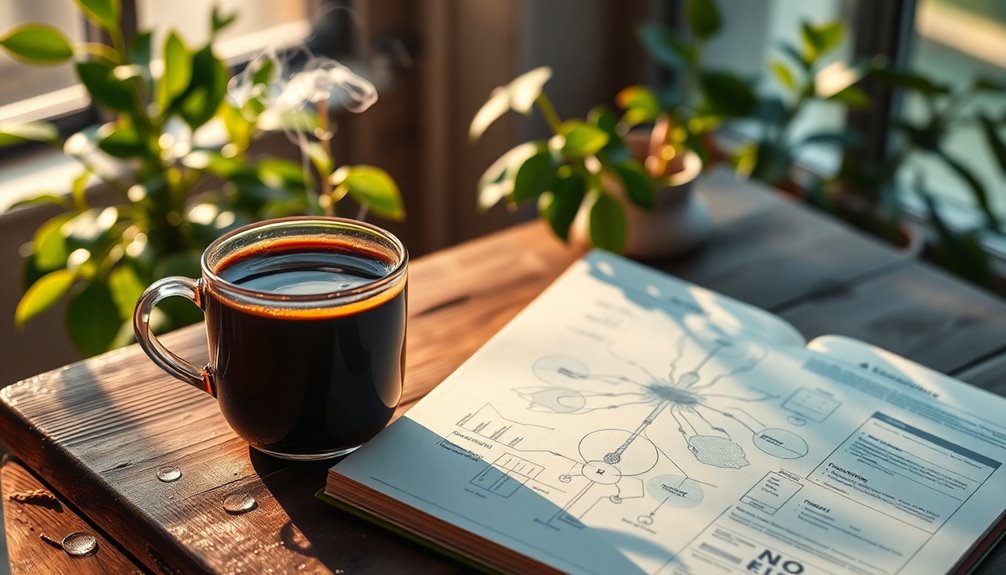The future of coffee looks bright with exciting trends and innovations. You’re likely to see a rise in specialty and functional coffees that cater to your health needs. Technologies like AI-driven brewing machines are making it easier to customize your coffee experience. Eco-conscious practices, including sustainable sourcing and packaging, are becoming standard as consumers demand transparency. The surge in home brewing options reflects a shift in how you enjoy your daily cup. As you explore these changes, you’ll find much more about how coffee’s evolving to enhance your lifestyle and well-being. To stay ahead of the game, keep an eye out for new flavors and blends, as well as innovative brewing methods. In addition, as more people are enjoying coffee at home, it’s important to ensure that your coffee maker is properly maintained to prevent mold and bacteria growth. Be sure to regularly clean and descale your coffee machine, and consider researching mold prevention tips for coffee makers to keep your brews fresh and safe. By staying informed and proactive, you can fully embrace the exciting future of coffee.
Key Takeaways
- The global coffee market is projected to grow at a CAGR of 4.28%, driven by evolving consumer preferences for specialty and artisanal coffee.
- Technological innovations, such as AI-driven brewing systems and smart coffee machines, enhance customization and improve overall coffee experiences.
- Health trends are leading to the rise of functional coffee products, incorporating health-boosting ingredients like nootropics and adaptogens.
- Sustainability remains a priority, with increasing consumer demand for ethically sourced coffee and eco-friendly packaging solutions.
- Social media influences coffee culture, fostering exploration of coffee tourism and educational experiences, especially among younger generations.
Global Coffee Consumption Trends

Global Coffee Consumption Trends
Every day, over 2.25 billion cups of coffee are consumed worldwide, showcasing the beverage’s immense popularity and cultural significance. As you explore global coffee consumption trends, you’ll notice that the market was valued at approximately $102.15 billion in 2020 and is projected to grow at a compound annual growth rate (CAGR) of 4.28% through 2028.
This growth is fueled by an increasing preference for specialty coffee, with 36% of coffee drinkers seeking unique flavors and quality experiences. Additionally, the rise of different brewing methods has contributed to a more personalized coffee experience, allowing consumers to explore various styles and tastes.
You’re also likely aware that the pandemic has changed how people enjoy their coffee, leading to a surge in home brewing equipment sales. These lifestyle shifts are shaping new consumption patterns.
Emerging markets are influencing global coffee consumption trends, as consumers in these areas are developing distinct preferences that challenge traditional norms.
Coffee is getting more diverse, with an array of options becoming available to satisfy evolving tastes. As trends continue to shift, it’s important to stay informed about how these changes impact what you drink daily and the broader coffee industry landscape.
Sustainability and Ethical Practices

When you choose coffee with Fair Trade certifications, you support ethical practices that benefit producers and protect the environment.
Consideration of natural remedies in the coffee industry is also gaining traction, as consumers look for ways to incorporate health-conscious choices into their daily routines.
Eco-friendly packaging solutions are also on the rise, helping to reduce waste and promote sustainability.
Together, these trends reflect your growing demand for responsible coffee choices that make a positive impact.
Fair Trade Certifications
Fair trade certifications have become a cornerstone of sustainability and ethical practices in the coffee industry. As a consumer, you might be one of the 60% willing to pay more for sustainably sourced coffee, reflecting the growing demand for ethical sourcing practices. Certifications like Fair Trade and Rainforest Alliance are gaining popularity because they provide the transparency and accountability many of you seek in coffee supply chains.
Additionally, understanding the importance of budget management can help consumers make informed choices about their coffee purchases, ultimately supporting sustainable brands.
Coffee producers are increasingly adopting regenerative agriculture practices, aligning with fair trade principles to protect local ecosystems and promote sustainable farming methods. This shift not only supports the environment but also enhances the livelihoods of farmers.
Companies prioritizing fair sourcing often focus on reducing their overall environmental impact, including implementing biodegradable packaging solutions.
With consumers like you demanding compliance with transparency regulations, ethical sourcing has become essential in your coffee choices. Fair trade certifications assure you that the coffee you enjoy is sourced responsibly, ensuring fair wages and working conditions for farmers.
Eco-Friendly Packaging Solutions
Eco-friendly packaging solutions are transforming the coffee industry, making it more sustainable and responsible. As a consumer, you might be pleased to know that 60% of people are willing to pay more for sustainably sourced coffee. This growing demand is pushing major coffee brands to adopt biodegradable packaging made from compostable materials, helping to greatly reduce landfill waste and lessen environmental impact.
Additionally, similar to how Gold IRAs offer potential for long-term capital appreciation, investing in sustainable coffee practices can provide lasting benefits for both the environment and your health.
Companies are increasingly focusing on sustainable sourcing and environmentally friendly practices, emphasizing the reduction of carbon footprints in coffee production and distribution. Certifications like Fair Trade and Rainforest Alliance are gaining traction, motivating brands to implement these eco-friendly packaging solutions and ethical sourcing methods.
Moreover, the rise of recycling initiatives, like programs that encourage reusing coffee grounds, promotes circular economy practices within the coffee sector. These efforts not only enhance the sustainability of the industry but also appeal to eco-conscious consumers like you.
The Rise of Specialty Coffee

The Rise of Specialty Coffee
In recent years, the specialty coffee segment has surged in popularity, capturing the attention of coffee drinkers who crave quality and unique flavor profiles. About 36% of coffee enthusiasts now prefer specialty options, reflecting a growing desire for premium, artisanal experiences. This trend is driven largely by younger generations, particularly millennials and Gen Z, who seek out innovative flavors, such as cold brew and nitro coffee.
Many coffee aficionados are also experimenting with various preparation techniques, including making the perfect Americano, which enhances their appreciation for the beverage unique flavor profiles.
The meticulous selection of high-quality beans has become central to the specialty coffee movement. Coffee lovers are increasingly exploring the nuances of different roasts and origins, leading to a richer, more engaging coffee drinking experience.
Social media plays a significant role here, shaping coffee culture and influencing your choices, as you discover new cafes and brewing methods online.
Moreover, the rise in coffee tourism speaks to a deeper connection with the beverage. Many of you’re keen to visit coffee farms, learning about production firsthand and gaining insights into the journey from bean to cup.
This immersive experience fosters a greater appreciation for specialty coffee, making it more than just a drink—it’s now a cultural phenomenon you can enjoy and explore.
Health Trends in Coffee Consumption

As you explore the future of coffee, you’ll notice a surge in functional coffee innovations packed with health-boosting ingredients like nootropics and adaptogens.
This trend mirrors a broader movement towards beverages with health benefits, similar to the increasing popularity of Cranberry Juice Consumption that emphasizes antioxidant-rich options.
These trends reflect not just a shift in consumer preferences, but also a growing awareness of coffee’s potential health benefits.
With options like low-caffeine and organic blends, there’s never been a better time to choose a brew that supports your well-being.
Functional Coffee Innovations
A growing number of consumers are turning to functional coffee innovations that not only satisfy their caffeine cravings but also enhance their health. These innovations incorporate health-enhancing ingredients like vitamins and nootropics, promoting cognitive function and alertness.
For example, certain blends may include herbal teas like ginger, known for their pain-relieving properties, which can complement the effects of coffee. You might find yourself reaching for coffee infused with adaptogens, which are known for their stress-relief properties, perfectly aligning with the demand for health-conscious beverage options.
Research shows that coffee consumption can reduce the risk of certain diseases, fueling interest in these healthier alternatives. If you’re health-conscious but still want to enjoy coffee, you’ll be pleased to see the rise of low-caffeine and decaffeinated options. These products let you enjoy your favorite beverage without the jitters often associated with caffeine.
Functional coffee innovations often feature superfoods and adaptogens, reflecting a broader trend among consumers seeking drinks that offer tangible health benefits while still providing that enjoyable coffee experience.
As you explore the world of functional coffee, you’ll discover endless possibilities to enhance your daily routine without sacrificing taste or satisfaction. So, why not embrace these innovative options and elevate your coffee game?
Health Benefits of Coffee
Coffee boasts a plethora of health benefits that go beyond just providing a much-needed energy boost. As you sip your favorite brew, you’re not just enjoying the taste; you’re also fueling your body with powerful compounds that can enhance your well-being.
Recent studies have also highlighted the role of coffee in enhancing cognitive functions through AI-powered virtual reality in e-learning. Here are some key health benefits of coffee you should know:
- Rich in antioxidants, which help reduce inflammation.
- Linked to a lower risk of Type 2 diabetes and cardiovascular issues.
- Functional coffee products now infused with vitamins and adaptogens promote cognitive function.
- Low-caffeine and decaffeinated options cater to health-conscious consumers.
- The shift towards organic and non-GMO coffee aligns with wellness trends.
With these health benefits, it’s no wonder coffee’s popularity continues to rise. You can feel confident that your daily cup not only satisfies your cravings but also supports your overall health.
As awareness of coffee’s positive effects grows, exploring different blends and brewing methods can lead you to discover even more ways to enjoy its benefits. So, whether you’re seeking energy or looking to enhance your health, coffee can be a delightful and beneficial choice.
Technological Innovations in Brewing

Technological innovations are transforming the way you brew your favorite beverage, making the process more personalized and efficient than ever. AI-driven coffee machines are at the forefront of this revolution, allowing you to customize brewing parameters to match your unique taste preferences. With these machines, you can enjoy a coffee experience tailored just for you.
Additionally, exploring key skills in coffee brewing can enhance your overall experience. Automated roasting systems utilize AI for real-time flavor optimization, ensuring that each cup delivers consistent, high-quality results. Meanwhile, coffee shops are integrating augmented reality (AR) menus, which enhance your ordering experience and engage you in a whole new way.
Smart coffee machines equipped with IoT technology offer the convenience of remote monitoring and troubleshooting, streamlining operations for coffee businesses and ensuring that your favorite shop runs smoothly.
Data analytics also plays a crucial role by refining customer interactions and improving operational efficiency. With better demand forecasting and inventory management, coffee producers can meet your needs more effectively.
As these technological advancements continue to evolve, you can expect an even more enjoyable and personalized coffee experience, making each cup not just a beverage, but a reflection of your tastes.
Consumer Behavior Shifts

As brewing methods evolve, so do your preferences and behaviors as a consumer. You’re not just looking for a caffeine fix anymore; you want unique coffee experiences that resonate with your lifestyle. Here are some trends shaping your choices:
- The convenience of functional ready-to-drink (RTD) coffee, especially those infused with health-enhancing ingredients like adaptogens and nootropics, aligns with the growing interest in hamster health and wellness.
- A growing desire for specialty and artisanal options, driven by younger generations craving unique flavors and memorable experiences.
- Increased interest in coffee education, where you might find yourself attending brewing workshops or tasting events to deepen your appreciation.
- The rise of plant-based dairy alternatives, aligning your coffee habits with healthier and ethical dietary choices.
- The influence of social media, which shapes your coffee culture and invites you to explore coffee tourism and diverse experiences.
These shifts reflect a broader transformation in how you engage with coffee. You’re not just consuming; you’re seeking deeper connections and more enriching experiences with every cup.
As these trends continue to unfold, your choices will certainly pave the way for the future of coffee.
Regulatory Challenges in the Industry

Regulatory challenges frequently impact the coffee industry, forcing brands to adapt swiftly to new laws and consumer expectations. Ongoing lawsuits in California are scrutinizing health claims and labeling practices, pushing you as a coffee brand to enhance transparency and compliance.
These new regulations also increase scrutiny on sustainable and ethical sourcing practices. You’ll need to adopt responsible sourcing methods to meet these demands.
Additionally, investigations into greenwashing are targeting major coffee corporations for misleading environmental claims. This scrutiny leads to a heightened push for genuine sustainability efforts within the industry. It’s essential for you to navigate these regulatory challenges effectively to maintain consumer trust.
As legal challenges drive innovation, your brand must stay proactive in addressing these issues. Access to industry insights and support services, like the FutureBridge Platform, can be invaluable for adapting to the evolving regulatory landscape and market dynamics.
Future Market Growth Projections

With the global coffee market projected to grow from approximately $102.15 billion in 2020 to a CAGR of 4.28% from 2021 to 2028, there’s a clear indication of robust demand and expansion in the industry.
This growth isn’t just about traditional brews; cold brew coffee is becoming a favorite, driving consumers towards invigorating options.
Several key trends are fueling this market expansion:
- Preference for Specialty Coffee: 36% of coffee drinkers favor premium options, emphasizing quality and origin.
- Home Brewing Equipment Sales: As more people brew at home, sales have surged, reflecting a shift in consumer behavior.
- Coffee Subscription Services: These services are on the rise, offering convenience and variety that attract busy consumers.
- Emerging Markets: Regions like Asia and Africa are notably influencing global consumption and production trends.
- Health Innovations: New health-focused coffee products are appealing to a broader audience.
As these trends converge, you can expect a vibrant coffee landscape that continues to evolve, catering to diverse tastes and preferences while maintaining a focus on quality and convenience.
The Role of Coffee in Wellness

Coffee’s role in wellness has evolved markedly, transforming from a simple morning ritual into a powerhouse of health benefits. Nowadays, you might find coffee beans infused with adaptogens and nootropics, enhancing cognitive function and stress management. This trend reflects a growing preference for health-conscious beverage options.
Research supports that coffee consumption is linked to a reduced risk of various diseases, largely due to its high antioxidant content and metabolism-boosting properties.
Moreover, as a health-conscious consumer, you may appreciate the rise of low-caffeine and decaf options, ensuring you can enjoy great flavor without the jitters. Many brands now prioritize decaffeinated coffee that retains taste while being easier on your system.
Additionally, the popularity of coffee infused with superfoods and vitamins caters to those seeking extra health benefits.
Importantly, around 60% of consumers are willing to pay more for sustainably sourced coffee. This highlights a strong connection between health and environmental consciousness.
Frequently Asked Questions
What Is the Future of the Coffee Industry?
The coffee industry’s future looks bright. You’ll see specialty brews gaining popularity, sustainable practices becoming standard, and technology enhancing your coffee experience. Health-focused options will rise, transforming how you enjoy your daily cup.
What Is the Future Prediction for Coffee?
You’ll see coffee evolve with a focus on sustainability and health. Expect to enjoy specialty blends, innovative brewing tech, and community-oriented cafes. As consumer preferences shift, your coffee experience will become more unique and personalized.
How Is Gen Z Shaping the Future of the Coffee Industry?
You’re witnessing Gen Z’s impact on the coffee industry firsthand. They prioritize sustainability, favor artisanal options, influence trends through social media, demand health-focused products, and embrace coffee tourism, reshaping how brands connect with consumers.
What Are the Coffee Trends in 2024?
Did you know over 60% of consumers in 2024 are willing to pay more for sustainably sourced coffee? You’ll notice a rise in specialty options, convenient RTD drinks, and health-focused ingredients shaping your coffee experience.
Conclusion
As you sip your morning brew, remember that the future of coffee is brewing with promise. Embracing sustainability, specialty varieties, and health innovations, the coffee landscape is evolving to meet your desires. With technological advancements paving the way, you’ll find your coffee experience enriched and more personalized than ever. So, whether you’re a casual drinker or a connoisseur, the world of coffee is set to delight your senses and nourish your well-being for years to come.










